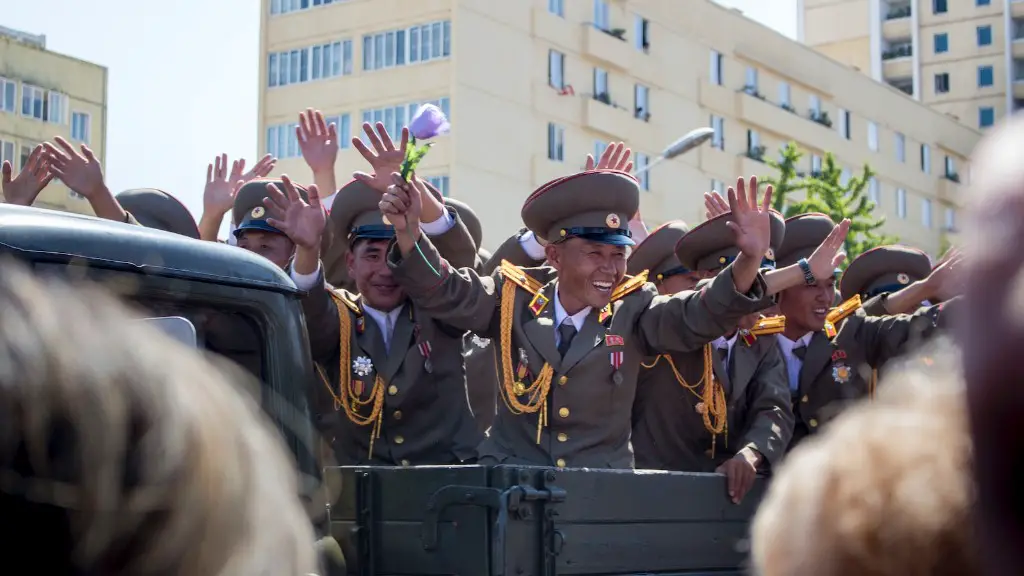Since the end of World War II, North Korea has been a thorn in the side of the United States, inspiring both fear and misunderstanding. Despite continuous attempts by the U.S. to apply economic pressure on North Korea, the rogue state has become a nuclear threat of unprecedented magnitude in recent years, leading many American politicians and military leaders to advocate for a military response. In this article, we’ll be exploring the ethical and practical consequences of potentially going to war with North Korea, offering insights from experts, analyzing relevant data, and ultimately teaching you how to make an informed decision.
In recent years, the weapons program in North Korea has been growing at a rapid pace. Since its first test of a nuclear warhead in 2006, North Korea has carried out dozens of weapon tests, including two intercontinental ballistic missile launches in 2017 alone – proving they have the capability to reach the U.S. mainland. These provocations have led to increased tension between North Korea and the United States, with U.S. President Donald Trump taking a hardline stance against the regime in Pyongyang.
The ethical implications of a potential war with North Korea must be considered before any action is taken. Proponents of a military response point to the human rights atrocities within the country and the danger posed by North Korea’s weapons in the hands of a madman, led by Kim Jong-Un. The risk of civilian casualties, the destruction of property, and the long-term economic and political costs of a war must be weighed against any possible military gains. While war may be desirable for some, it’s also important to consider the long-term consequences of military action, and the possibility of a peaceful solution to the impasse.
In terms of practical implications, it’s important to take into account the cost of a war with North Korea, both in terms of money and lives. The U.S. would require a large commitment of military forces and resources, as well as a potential deployment of nuclear weapons in order to effectively neutralize North Korea’s military capabilities. On top of this, the potential international repercussions must also be considered. It’s likely that other countries in the region, such as China and South Korea, would become involved in any conflict, leading to a more complicated and potentially more costly situation.
Experts have weighed in on the potential war with North Korea, offering a range of views. Some have cautioned the U.S. against entering into armed conflict with the rogue state, citing the potential for extensive civilian casualties, economic costs, and the risk of nuclear escalation. Others have praised the idea of a war with North Korea on the basis that it would lead to regime change and an end to the Kim family’s tyranny. Ultimately, it’s difficult to predict the outcome of a war with North Korea, and only time will tell if the U.S. decides to take the plunge.
Potential Military Engagement
If the U.S. were to enter into a military conflict with North Korea, it would require a significant commitment of resources and manpower. The U.S. military would be forced to employ a wide variety of tactics to achieve victory, including the use of air power, naval vessels, and special operations forces. It is likely that the U.S. would be forced to deploy nuclear weapons in order to neutralize North Korea’s own nuclear capabilities, which could lead to a dangerous escalation of the conflict.
Military strategists have estimated that a U.S. offensive against North Korea would require an initial period of weeks of preparation, followed by a much longer period of conflict. Furthermore, even in the event of a successful operation, there could be high casualties among troops and civilians alike, creating a moral and ethical dilemma for the U.S. government.
North Korea’s safety net provided by China must also be taken into account when considering a potential war. China has been a loyal ally to the North Korean government, providing them with much needed economic and military support. It is highly likely that China would enter into the conflict if the U.S. were to launch an offensive against North Korea, leading to a much longer and more complex war than some anticipate.
Finally, the potential for a nuclear crisis cannot be overstated. As North Korea has repeatedly demonstrated, it has the capability to attack American cities and military installations with nuclear weapons. This threat must be taken seriously and appropriate measures must be taken to mitigate such a potentially catastrophic outcome.
Effects on Civilian Population
Any potential military engagement with North Korea would have devastating effects on the civilian population. It is estimated that there are over 24 million people living in North Korea, with the majority of citizens living in poverty and without access to basic amenities such as clean water and medical care. Furthermore, a US-led attack on North Korea could cause a mass exodus of refugees seeking safety in neighboring countries.
The North Korean government is also notorious for its brutality towards its citizens, with reports of torture, forced labor, and the persecution of those seen as dissidents. In the event of a war, it is likely that the North Korean government would use its own citizens as human shields and provoke indiscriminate violence against civilian populations. This would lead to untold suffering and distress, with no guarantee that it would result in the desired outcome.
The mass violations of human rights have been condemned by the United Nations, with various countries applying economic sanctions in a bid to force the North Korean government to change its ways. Despite this, the situation for the people of North Korea has continued to worsen and the prospects of a better life appear distant.
Any war between the U.S. and North Korea would involve the vicious targeting and killing of innocent civilians. While it is certainly true that war can bring about regime change and improve a nation’s fortunes in the long-term, the immediate repercussions cannot be overlooked. A war with North Korea would bring death and destruction to an already suffering population and must only be undertaken as a last resort.
Anti-War Movement
As expected, the prospect of a U.S.-led war with North Korea has met with significant opposition at home, with anti-war protests being held in major cities across the country. Protestors are advocating for a peaceful resolution to the current standoff, citing the potentially catastrophic consequences of a full-scale war between two nuclear-armed states. The U.S. government has also made efforts to avoid a military conflict, engaging in direct talks with Pyongyang in recent months.
The protest movement against a war with North Korea has been supported by a number of prominent figures, such as former U.S. President Jimmy Carter and the Dalai Lama. These figures have emphasized the importance of dialogue and diplomacy in averting an armed conflict, arguing that a peaceful resolution is still possible despite the current tensions.
At the same time, however, the Trump administration has taken a hardline stance in its negotiations with North Korea, placing economic sanctions on the regime and threatening military action should they fail to comply. This apparent contradiction has caused confusion among many, with both sides emphasizing different strategies in the ongoing conflict.
Ultimately, it remains to be seen what will happen next with regards to the North Korean situation. The Trump administration must weigh the ethical and practical implications of a potential war before making any decisions, while anti-war protestors must continue to make their voice heard in order to ensure that any potential conflict is avoided.
Potential Outcomes
As is often the case with international policy, predicting the outcomes of a potential war with North Korea is difficult. Depending on the nature of the conflict, it’s possible that the U.S. could emerge victorious, leading to the deposition of the Kim family and the establishment of a new government. However, it’s also possible that the U.S. would suffer heavy casualties and be forced to withdraw from the region in defeat.
It’s also possible that the conflict could be stalemated, with neither side emerging as victor. In this scenario, it’s likely that the people of North Korea would suffer the most, with an indefinite period of conflict leading to more suffering and deprivation.
Finally, it’s also possible that a military action won’t be required at all. Negotiations between the two sides have continued and it’s possible that a peaceful resolution can be reached, with sanctions being lifted and the long-standing conflict between the two nations coming to an end.
There are no easy answers when it comes to resolving the conflict between the U.S. and North Korea. It’s a complex problem with both ethical and practical implications, and any decision must be made with careful consideration.
International Response
It is likely that any conflict between the U.S. and North Korea would draw in other countries, potentially leading to an international crisis. China, South Korea, Japan, and Russia are all likely to take sides in any conflict, meaning the potential for escalation is very real.
China, in particular, has been a steadfast ally of North Korea and could potentially intervene on their behalf. Russia also has an interest in the conflict, supporting the Kim regime and helping to maintain the status quo in the region. Japan and South Korea, for their part, have both spoken out against a war with North Korea and have actively sought diplomatic solutions instead.
The international community has been vocal in its condemnation of North Korea, with the United Nations passing various resolutions throughout the years designed to pressure the Kim regime into changing its ways. If war were to break out, it’s possible that the UN Security Council could step in and move towards a peaceful resolution of the conflict.
Ultimately, the international response to a potential war with North Korea is likely to be heavily divided and highly unpredictable. Countries such as China, Russia, and Japan could become involved, potentially leading to a larger, more complicated conflict.
Conclusion
The conflict between the United States and North Korea is a complex and deeply concerning situation. As the rogue state continues to develop its weapons program, the potential for a full-scale war becomes ever more likely. However, it is important to consider the ethical and practical implications of such a conflict before any decision is taken.
Experts have weighed in on the situation, offering a range of perspectives. Some have argued for the need for a military response to neutralize the threat posed by North Korea, while others have opposed the idea on the basis of civilian casualties, economic costs, and the risk of nuclear escalation. Ultimately, it is up to the American people to decide if war is the right course of action.





